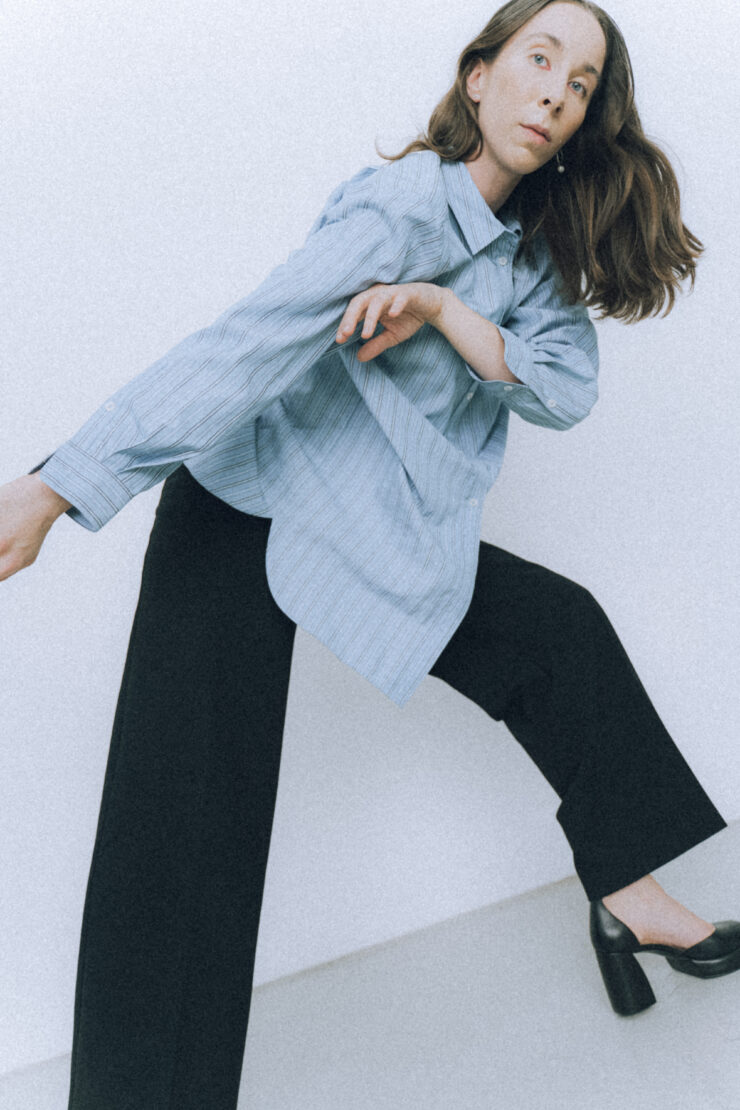
Alevtina Gruntovskaya
Artist with MA Dance since 2022
Alevtina Gruntovskaya graduated from Chernyshevsky State University in Saratov as a philologist and Vaganova Academy of Russian Ballet majoring in Artistic Practices of Modern Dance. She worked in the Contemporary Dance Theatre “Guildiya” (St. Petersburg, 2015-2016), Ksenia Mikheeva’s project (St. Petersburg, 2017-2019).
In 2017 and 2019, she completed internships with the DASS (Dance Academy Season School) project in Tel Aviv and Amsterdam. She studied at master classes with Maria Kolegova, Germaine Jauregui, Dor Mamalia, and in the laboratory of the Humanhood dance company (Great Britain).
In 2018 she founded 9 a.m. Dance Company. Since 2022 she has been a choreographer and playwright of the Inclusive Troupe of Contemporary Dance and Performance of the Anton Tut Ryadom Foundation.
She participated in the following projects: The New Habit (Dom Radio, directed by Claudia Castellucci, 2021), Pulcinella (choreographer Nanine Linning, 2021), I Think it Seemed to You (GES-2, authors and directors Tatiana Chizhikova and Polina Bakhtina, 2022), Love Will Tear Us Apart (Dom Radio, choreographers Polina Mitryashina, Alya Gruntovskaya, director Anna Guseva, 2022), Lilac Pulsating Shine (SDVIG Performative Arts Space, choreographer Maria Sheshukova, 2022), Carl Orff’s De temporum fine comoedia (Perm, Diaghilev Festival, musical director Teodor Currentzis, choreographer Anastasia Peshkova, directed by Anna Guseva). She created the mono-performance “Illusion” (2021), acted as a dance playwright in the inclusive dance performance “On the Way” (2021-2022).
She writes critical articles and gives lectures on modern dance. She teaches at Diana Vishneva’s Context Studio. She is the curator of the educational programme “Theories About Practice: Reflection on Dance and Performance of the 20th and 21st Centuries” at Dom Radio.
musicAeterna orchestra events
Johannes Brahms (1833-1897)
Concerto for Violin and Orchestra in D Major, Op. 77 (1878)
Allegro non troppo
Adagio
Allegro giocoso — Poco piu presto
Dmitri Shostakovich (1906-1975)
Symphony No. 5 in D Minor, Op. 47 (1937)
Moderato
Allegretto
Largo
Allegro non troppo
Performers:
The musicAeterna Orchestra
Soloist — Olga Volkova, violin
Conductor — Teodor Currentzis
Gustav Mahler (1860-1911)
Symphony No. 5 in C Sharp Minor (1902)
- Trauermarsch. Im gemessenen Schritt. Streng. Wie ein Kondukt | At a measured pace. Strict. Like a funeral procession
- Stürmisch bewegt. Mit grösster Vehemenz | Moving stormily. With the greatest vehemence
- Scherzo. Kräftig, nicht zu schnell | Strong and not too fast
- Adagietto. Sehr langsam | Very slow
- Rondo-Finale. Allegro, Allegro giocoso
Richard Wagner (1813-1883)
The Prelude and the Death of Isolde from the opera Tristan and Isolde (1857-1859)
Performers:
The musicAeterna Orchestra
Conductor — Teodor Currentzis
Johannes Brahms (1833-1897)
Concerto for Violin and Orchestra in D Major, Op. 77 (1878)
Allegro non troppo
Adagio
Allegro giocoso — Poco piu presto
Dmitri Shostakovich (1906-1975)
Symphony No. 5 in D Minor, Op. 47 (1937)
Moderato
Allegretto
Largo
Allegro non troppo
Performers:
The musicAeterna Orchestra
Soloist — Olga Volkova, violin
Conductor — Teodor Currentzis
Gustav Mahler (1860-1911)
Symphony No. 5 in C Sharp Minor (1902)
- Trauermarsch. Im gemessenen Schritt. Streng. Wie ein Kondukt | At a measured pace. Strict. Like a funeral procession
- Stürmisch bewegt. Mit grösster Vehemenz | Moving stormily. With the greatest vehemence
- Scherzo. Kräftig, nicht zu schnell | Strong and not too fast
- Adagietto. Sehr langsam | Very slow
- Rondo-Finale. Allegro, Allegro giocoso
Richard Wagner (1813-1883)
The Prelude and the Death of Isolde from the opera Tristan and Isolde (1857-1859)
Performers:
The musicAeterna Orchestra
Conductor — Teodor Currentzis
Johannes Brahms (1833-1897)
Concerto for Violin and Orchestra in D Major, Op. 77 (1878)
Allegro non troppo
Adagio
Allegro giocoso — Poco piu presto
Dmitri Shostakovich (1906-1975)
Symphony No. 5 in D Minor, Op. 47 (1937)
Moderato
Allegretto
Largo
Allegro non troppo
Performers:
The musicAeterna Orchestra
Soloist — Olga Volkova, violin
Conductor — Teodor Currentzis